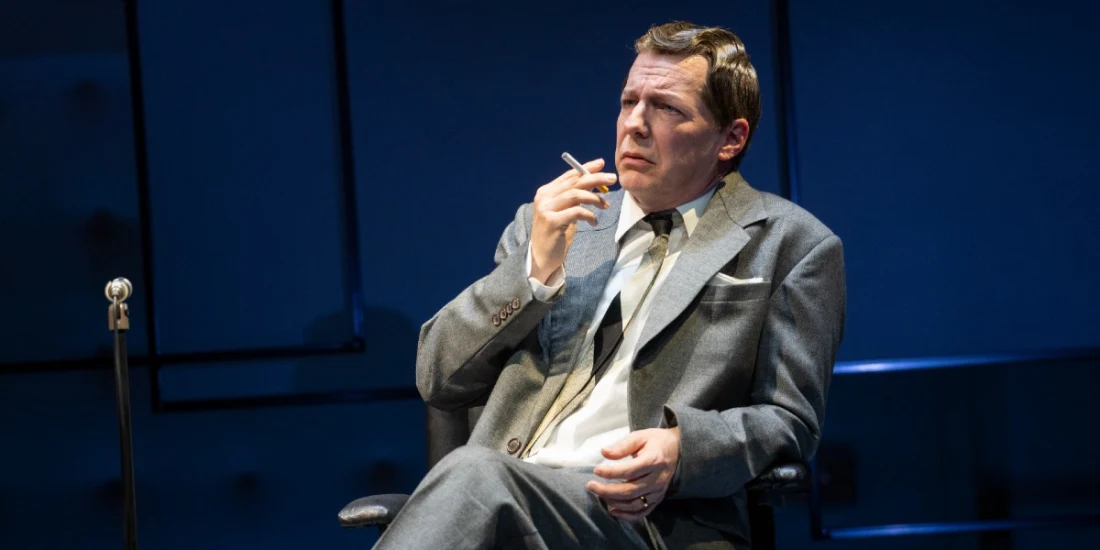'Good Night, Oscar' review — Sean Hayes delivers a virtuosic character study
Read our review of Good Night, Oscar, a new Broadway play written by Tony Award and Pulitzer Prize winner Doug Wright and starring Emmy Award winner Sean Hayes.
The star of Douglas Wright’s play Good Night, Oscar, now running on Broadway at the Belasco Theatre, is Sean Hayes, who receives above-the-title billing and will no doubt receive numerous accolades. But the second star is Jacqueline E. Lawton, the production’s dramaturg on Broadway and at the Goodman Theatre, where it premiered last year. Lawton ensures that the show balances its dips into the fantastical with historical truths, a difficult tone deftly achieved in Lisa Peterson’s adroit production. If only Broadway would embrace the lobby display to immerse audiences even more in Oscar Levant’s world.
Set on one turbulent night of Levant’s life, Good Night, Oscar sees Hayes not at the heyday of Levant’s career as a composer, pianist, and radio star, but as an ailing man struggling to control his addiction to the drugs his doctors have prescribed. The play tries to tackle the whole of Levant’s life in a few short scenes; a one-man show, like Wright’s Tony- and Pulitzer Prize-winning I Am My Own Wife, may have better suited the veneration of Levant’s talents and idiosyncrasies, channeling his alleged schizophrenia into different characters contained in one body.
But Hayes works best sparring with other actors, even if their characters aren’t fully developed. At one point, NBC president Bob Sarnoff (Peter Grosz) tries to cool Levant down: “The network feels —” to which Levant immediately interrupts, in a perfect distillation of the contemporary politics of corporate brands, “The network feels?”
Many characters exist only as devices: Fast-talking TV host Jack Paar (Ben Rappaport) upholds the play’s frame of The Tonight Show and delineates entertainment and exploitation. June (Emily Bergl), Levant’s wife, though granted no interiority, grounds the piece in historicity, as she had Levant committed to psychiatric institutions multiple times over their marriage. Sarnoff is stiff and corny, mostly speaking in platitudes and warnings and dwarfed by Levant’s boisterousness.
Alvin Finney (Marchánt Davis), an orderly from the hospital where Levant is staying (and from which June has concocted an ill-advised escape so he may appear on TV), serves only as a reminder of Levant’s condition; his note that Levant’s old pal George Gershwin (John Zdrojeski) stole musical inspiration from Black New Yorkers is a too-brief insight that, absent any other political or social commentary, feels out of place in the script. Only Alex Wyse delights as the nervous Max Weinbaum, a nepotism-hire page desperate to win the approval of those in charge and move up the movie-making ladder.
Gershwin himself appears as a figment of Levant’s imagination, the boldest choice in the play that suffers from a lack of direction. He enters in smoke effects, whipping his coattails behind him like Dracula, a haunting manifestation of Levant's survivor’s guilt (over Gershwin’s early death at 38) and supreme performance anxiety. He would rather discuss Levant’s psychoses than modern music, which makes sense only because of his boxed existence in Levant’s mind, a reminder of all Levant has yet to achieve. The character could be a game-changer in Good Night, Oscar, more a guide than a ghost, but Zdrojeski plays him like a haunted house attraction.
With a less compelling performance from its lead, Good Night, Oscar would fall flat. Its first half suffers from a lack of urgency; its second is burdened by hacky late-night antics. Almost everyone but Hayes’s Levant is forgettable in both performance and characterizations. Hayes is a marvel, embodying Levant in voice, spirit, physicality, and, eventually, music. He shakes like he’s davening prayer, fidgets like he's inebriated, and yells like his mind has left him without a choice.
Carolina Ortiz Herrera and Ben Stanton’s lighting design closes in on Levant as he hallucinates, fantasizes, and opines; these shifts, some subtle and some overt, call to mind the Brian Wilson biopic Love & Mercy, another exploration of both songwriting and schizophrenia. Rachel Hauck’s set serves as both recording studio and padded cell, further insulating Levant. Though the supporting personae fall flat, these design elements fuse with Hayes’s performance for a powerful and cohesive character study.
Correction: A previous version of this review incorrectly named Neena Arndt as dramaturg of Good Night, Oscar at the Goodman Theatre, not Jacqueline E. Lawton.
Photo credit: Sean Hayes in Good Night, Oscar. (Photo by Joan Marcus)
Originally published on
